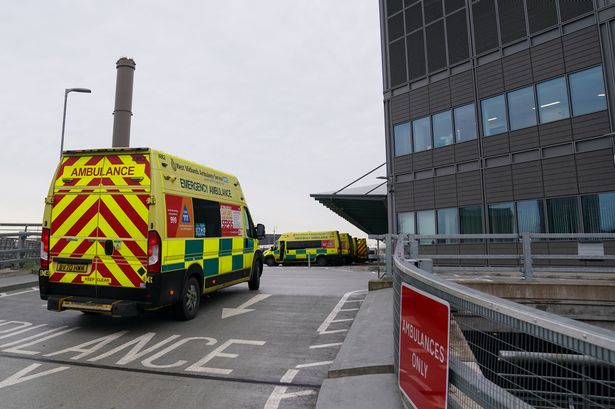On a fateful day in April 2022, sixteen-year-old Jackson Yeow found himself embroiled in a harrowing ordeal that would tragically end his life. Suffering from excruciating pain, young Jackson desperately needed emergency medical assistance. His family, witnessing his agonizing distress, immediately contacted the emergency services, placing their trust in the system designed to provide rapid and effective care. However, their hopes for swift intervention were cruelly dashed as they endured an agonizing wait of over nine hours for an ambulance to arrive. During this torturous period, Jackson’s condition deteriorated drastically. He lost consciousness, succumbing to the overwhelming pain and the critical delay in receiving medical attention. Upon the eventual arrival of the ambulance, Jackson was rushed to the University Hospital of Wales, where despite the efforts of medical professionals, he tragically passed away. This incident casts a stark light on the devastating consequences that can arise from protracted ambulance wait times, raising profound questions about the efficacy and responsiveness of emergency medical services.
The tragic demise of Jackson Yeow underscores a growing concern regarding ambulance response times, particularly within the context of an increasingly strained healthcare system. While target response times exist for various categories of emergency calls, ranging from immediately life-threatening situations requiring the fastest response to less urgent cases, several factors can contribute to delays. These can include a surge in demand, particularly during peak periods or widespread emergencies, resource constraints such as limited ambulance availability and staffing shortages, and geographical factors, including traffic congestion and the distance between the patient’s location and the nearest available ambulance. Furthermore, challenges within the emergency dispatch system itself, such as difficulties accurately triaging calls or efficiently coordinating resources, can also contribute to delays. The consequences of exceeding target response times can be severe, potentially leading to a worsening of the patient’s condition, increased suffering, and even, as tragically illustrated by Jackson’s case, death.
Delving deeper into the factors contributing to delayed ambulance responses reveals a complex interplay of systemic issues within the healthcare system. One prominent factor is the increasing demand for emergency medical services, often outpacing the available resources. This surge in demand can be attributed to various factors, including an aging population with more complex healthcare needs, a rise in chronic conditions requiring frequent medical attention, and increased reliance on emergency services for non-emergency situations. Compounding this issue are resource limitations, such as a shortage of ambulances and trained paramedics. These shortages can be attributed to various factors, including budget constraints, recruitment and retention challenges within the healthcare sector, and increasing workload pressures, leading to burnout and staff attrition. Furthermore, inefficient resource allocation and coordination, coupled with inadequate investment in infrastructure and technology, can further exacerbate the problem.
The consequences of delayed ambulance responses extend beyond the immediate impact on individual patients, rippling through the broader healthcare system. Overburdened emergency departments, already grappling with patient influx, face further strain as patients arrive in more critical conditions due to delayed care. This can lead to longer wait times in emergency rooms, reduced capacity to attend to other emergencies promptly, and a compromised quality of care for all patients. Furthermore, delayed responses can result in increased morbidity and mortality rates, particularly for time-sensitive conditions like heart attacks and strokes. The financial implications are also significant, as delayed care can lead to more complex and costly treatments, longer hospital stays, and increased rehabilitation needs. Moreover, the emotional and psychological toll on patients, families, and healthcare professionals alike cannot be overstated, as the experience of delayed care can lead to anxiety, distress, and a sense of helplessness.
The tragic case of Jackson Yeow serves as a stark reminder of the urgency with which these systemic issues within emergency medical services must be addressed. A comprehensive approach is needed, encompassing both short-term solutions and long-term strategies to strengthen the resilience and responsiveness of the system. In the immediate term, measures could include optimizing dispatch protocols and resource allocation to ensure the most efficient deployment of available ambulances, exploring innovative models of care, such as community paramedicine, to provide timely intervention for less urgent cases and alleviate pressure on ambulance services, and enhancing communication and collaboration between emergency medical services and other healthcare providers to facilitate seamless patient transfers and reduce delays in accessing definitive care.
In the long term, more fundamental reforms are necessary to address the root causes of the problem. This includes increasing investment in ambulance services, expanding the fleet and recruiting and training more paramedics to meet the growing demand. Furthermore, addressing the underlying factors contributing to increased demand for emergency services, such as improving access to primary care and preventative healthcare, is crucial. This would enable individuals to manage their health conditions effectively, reducing the reliance on emergency services for non-urgent issues. Finally, integrating technological advancements, such as telemedicine and data analytics, can optimize resource allocation, improve triage accuracy, and enhance communication within the healthcare system, ultimately contributing to more timely and effective emergency medical responses. The legacy of Jackson Yeow should be a catalyst for transformative change, ensuring that no other individual suffers the same tragic fate due to a system failing to deliver timely and life-saving care.














